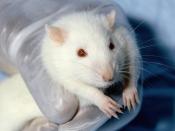Today, many scientists and philosophers are concerned with animal rights advocatesÃÂ beliefs that all animals, including ones used for laboratory testing and experimentation, deserve legal protection.
The Wilmington Morning Star, ÃÂFirst, Animals ArenÃÂt PeopleÃÂ, Adrian Morrison, D.V.M., Ph.D wrote an article dated August 2, 2002. In this article, Dr. Morrison states his concerns with the proponents of animals rights belief that animals have rights due to the following facts: (1) certain animals share qualities of consciousness that have heretofore been seen as uniquely human; (2) animals are brutalized in research; and (3) research with animals has been made obsolete by computers and other technology. Dr. Morrison asserts that these statements are wrong. He feels that limited similarities of consciousness are not sufficient grounds to grant legal personhood to animals. He also states that scientists have every reason to treat animals humanely because good science depends on healthy animals, which is enforced by laws ensuring humane care.
Lastly, he assures that there is no substitute for animal-based research. Dr. Morrison assumes that the legal interest in animal rights is not truly an effort to protect animals, but an effort to ÃÂenforce a flawed ethic concerning the relationship between humanity and the animal world.ÃÂ He also believes that because there has been such medical advancement due to animal-based research, it is not only ethical, but also our obligation. Dr. Morrison lists what he calls the "First Principles of Research" supporting his argument which includes and explains: (1) all human beings are persons; (2) our first obligation is to our fellow humans; (3) animals are not little persons; and (4) we have a great obligation to the animals under our control. Finally, Dr. Morrison says that ÃÂthose who try to draw other species into the human fold by emphasizing intellectual abilities that are but shadows of our own, demean those speciesÃÂ and expresses that they should be appreciated in their own right, merely wonderful creations of nature.
My opinion on animal-based research is not biased. I strongly feel that even if we do get benefits from animal experiments, benefit alone cannot justify morally the exploitation of animals.
If getting benefits from exploiting animals was alone sufficient to justify their exploitation, then why doesnÃÂt that argument work when humans are concerned? After all, no one would dispute that we would get even greater benefits if we used un-consenting humans in experiments. So why not use un-consenting humans if there would be great benefits for all the rest of us? We do not use un-consenting humans because we believe that humans have certain interests that must be protected. Humans have certain rights, and their most fundamental right is not to be treated as property. That is why almost all nations agree that slavery, or the legally sanctioned and legally mandated treatment of humans as things, is a true universal moral taboo to be condemned.
If we are to justify this exploitation, it is necessary that we somehow distinguish animals from humans, and that is much easier said than done. After all, precisely what characteristic or "defect" is it that animals have that justifies our treatment of them as our slaves, as property that exists only for the sake of us, the human masters.
Some people say that animals are different because they cannot think. But that is simply not true. We know that mammals and birds, for example, have very complex mental structure. And besides, there are human beings who cannot think. Some people were born without parts of their brain, and they have less cognitive functioning than a healthy rat. Some other people develop brain death later in life, and simply appear to be functioning. Some people say that animals are different because they cannot talk. But animals communicate in their own ways, and besides, some people are unable to talk. The list goes on and on but the bottom line remains the same: there is no "defect" that is possessed by animals that is not possessed by some group of humans, and yet we would never think of using that group of humans in experiments.
Animals, like humans, have certain interests in their own lives that transcend what their so-called "sacrifice" might do for us. And it is precisely those interests that prevent us as a matter of simple morality from treating them merely as "things." To say that we can exploit animals because we are "superior" is nothing more than to say that we are more powerful than they. And, with the exception of the Republican Party, most of us reject the view that might make it right. So why it is that principle so blindly embraced when it comes to our treatment of animals?In conclusion, Dr. Morrison may continue to challenge the fact that animal-based research is inhuman. However, the reality is that we like to think that we have eliminated all forms of slavery from our lives, but we are all slave owners, the plantation is the earth, sown with the seeds of greed, and the slaves are our nonhuman brothers and sisters.
Works Cited: The Wilmington Morning Star, ÃÂFirst, Animals ArenÃÂt PeopleÃÂ, Adrian Morrison, D.V.M., Ph.D, article dated August 2, 2002.





